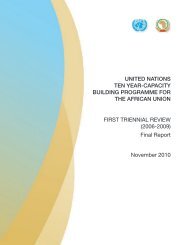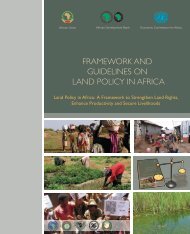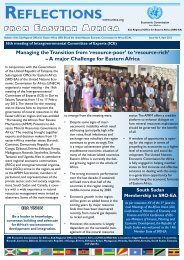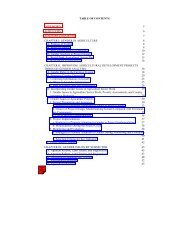A Decade of NEPAD - Economic Commission for Africa - uneca
A Decade of NEPAD - Economic Commission for Africa - uneca
A Decade of NEPAD - Economic Commission for Africa - uneca
You also want an ePaper? Increase the reach of your titles
YUMPU automatically turns print PDFs into web optimized ePapers that Google loves.
14 A <strong>Decade</strong> <strong>of</strong> <strong>NEPAD</strong>: Deepening <strong>Africa</strong>n Private Sector and Civil Society Ownership and Partnership<br />
strategy, taking into account three critical areas: the communication<br />
within the AU-<strong>NEPAD</strong>-RECs-country framework,<br />
the communication and advocacy <strong>for</strong> the <strong>Africa</strong>n<br />
agenda, value and principles to <strong>Africa</strong>n citizens, and the<br />
image creation about <strong>Africa</strong> internationally. It will aim<br />
at broad outreach within and outside the continent, and<br />
should promote inclusive advocacy processes <strong>for</strong> mobilizing<br />
and drawing upon <strong>Africa</strong>n stakeholders, including<br />
particularly youth, civil society, academia , the private<br />
sector and Diaspora. 9<br />
9 <strong>NEPAD</strong> Secretariat Business Plan, August 2009 – December 2010,<br />
Strategic New Directions, p. 7<br />
Strengths<br />
• Eight years <strong>of</strong> promotion – international brand recognition<br />
• AU backing and integrated agency status<br />
• Adoption by international donor community – Bretton Woods<br />
Organs, OECD states, G8 states, UN system, European Union (EU)<br />
system, major bilateral donors to <strong>Africa</strong><br />
• Backing by <strong>Africa</strong>n multilateral institutions – AfDB, ECA<br />
• REC support<br />
• New 5 year AAP<br />
• New Secretariat Structure<br />
• APRM programme<br />
• CAADP programme<br />
• Growing number <strong>of</strong> private sector and CSO support entities<br />
Weaknesses<br />
• Despite tens years <strong>of</strong> promotion – poor continent level brand<br />
positioning<br />
• Uneven member state support – financially and in terms <strong>of</strong> alignment<br />
with national development programmes<br />
• Week and under-capacitated RECs<br />
• Poor communications network, strategy and implementation programme<br />
–too little engagement with <strong>Africa</strong>’s media<br />
• Limited <strong>Africa</strong>n CSO, private sector and Diaspora engagement<br />
and input<br />
• Over dependence on donor funding<br />
• Competing (appearance <strong>of</strong> competing) <strong>Africa</strong>n development initiatives<br />
– Millennium Challenge Fund, TICAD, EU/ACP Initiatives<br />
• Low level grassroots understanding in <strong>Africa</strong><br />
• Disparate tangible achievement since inception<br />
• Few incentives <strong>for</strong> supporting <strong>NEPAD</strong> implementation<br />
• Limited credit / branding/ recognition given to <strong>NEPAD</strong> <strong>for</strong> successfully<br />
implemented regional projects<br />
Furthermore, key results areas specified in the Business<br />
Plan included:<br />
ӹ Mobilization <strong>of</strong> <strong>Africa</strong>n stakeholders around the AU/<br />
<strong>NEPAD</strong> agenda and programmes; and<br />
ӹ Mobilization <strong>of</strong> popular political support around the<br />
priority projects.<br />
A contemporary SWOT (strengths, weaknesses, opportunities,<br />
threats) analysis reveals that although the AU/<br />
<strong>NEPAD</strong> initiative has some hurdles to overcome, it is in a<br />
strong position to achieve its ends if it works to leverage<br />
all <strong>of</strong> its resources, including the <strong>Africa</strong>n private sector<br />
and civil society:<br />
Opportunities<br />
• New AAP is more implementation friendly<br />
• New Secretariat has more resources<br />
• Member state recognition that regional integration is key to growth<br />
and development<br />
• Accelerated REC ef<strong>for</strong>ts to integrate<br />
• Existing group <strong>of</strong> projects that <strong>of</strong>fer viable, immediate opportunities<br />
<strong>for</strong> stakeholder engagement<br />
• China, India, Brazil interest in <strong>Africa</strong> creates economic stimulus<br />
<strong>for</strong> many countries on the continent<br />
• Growing intra-regional trade and investment on continent driven<br />
by new regional multinationals from North <strong>Africa</strong>, Nigeria, Kenya<br />
and South <strong>Africa</strong><br />
• Growth in ef<strong>for</strong>ts to channel Diaspora capital to productive investment<br />
and mobilize Diaspora technical resources<br />
• Improvement in tax collection and increased domestic resources<br />
available to support <strong>NEPAD</strong> implementation<br />
Threats<br />
• Continued global financial crisis<br />
• Poor state <strong>of</strong> western state economies which will impact their ef<strong>for</strong>ts<br />
to make good on aid commitments<br />
• Poor state <strong>of</strong> western and global economies also has the potential<br />
to reduce quantity and earnings from <strong>Africa</strong>n exports<br />
• Competing bilateral commitments – particularly the EU’s <strong>Economic</strong><br />
Partnership Agreement (EPA) arrangements<br />
• Inability to get member states to make <strong>NEPAD</strong> relevant within<br />
national economic development strategies<br />
• Continued duplicity <strong>of</strong> ef<strong>for</strong>t within overlapping RECs<br />
• HIV/AIDs and Malaria as <strong>Africa</strong>n human resource debilitating<br />
pandemics<br />
• High cost <strong>of</strong> implementation







